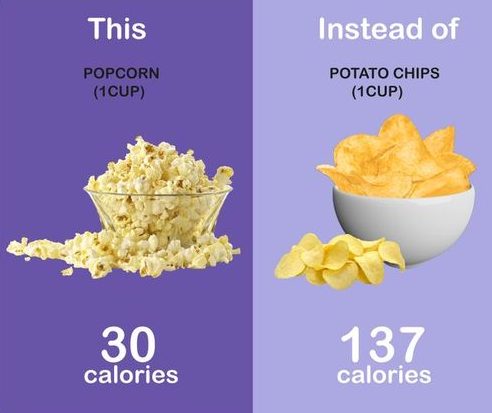How Many Calories in a Bag of Popcorn: You Should Know
Popcorn
Popcorn is a beloved snack enjoyed by people of all ages. Its light and crunchy texture, combined with its versatility, make it a popular choice for movie nights, parties, and everyday munching. However, many individuals wonder about the calorie content of popcorn and its nutritional value. Read about How Many Calories in a Chicken Wingette
Calories and Nutrition
Before delving into the specifics of popcorn calories, it’s essential to understand what calories are and how they contribute to nutrition. Calories are a measure of the energy provided by food and beverages when consumed and metabolized by the body.

Factors Affecting Popcorn Calories
Popcorn itself is a naturally low-calorie whole grain, but its final calorie count can transform depending on how you prepare it. From the type of fat used to the added flavorings, every decision can influence the numbers on the scale. So, unleash your inner popcorn scientist! Experiment with air-popping for a base layer of lightness, then explore different seasonings and healthy drizzle options. You can enjoy a satisfying snack with a little creativity without sacrificing your health goals.
Different Types of Popcorn
There are several types of popcorn available, each with its unique characteristics and nutritional profiles. Learn about Calories for Spicy Tuna Roll

Microwave Popcorn: Calories and Considerations
Microwave popcorn beckons with its irresistible aroma. However, while convenient, it’s important to be mindful. Pre-packaged options can be loaded with hidden calories and unhealthy fats. But fear not, popcorn lovers! Explore air-popped options for a lighter base, or add a drizzle of heart-healthy oil for stovetop popping with a touch of flavor. Remember, portion control is key. By making smart choices, you can still enjoy this classic treat without derailing your healthy habits.
Air-Popped Popcorn: A Healthier Option?
Craving a satisfying crunch without the guilt? Air-popped popcorn is your superhero snack! This fluffy favorite is a whole-grain powerhouse, boasting fiber to keep you feeling fuller for longer. Unlike its microwave and movie theater counterparts, air-popped popcorn is free of unhealthy fats, artificial flavors, and excessive sodium. It’s a blank canvas for your healthy flavor adventures – add a sprinkle of herbs for a savory kick, nutritional yeast for a cheesy twist, or keep it classic with a touch of sea salt.
Oil-Popped Popcorn: What to Watch Out For
Oil-popped popcorn isn’t inherently bad, but there are some things to consider to make it a healthier choice:
- Oil Selection: Not all oils are created equal. Avoid unhealthy fats like saturated and trans fats. Opt for heart-healthy options like avocado oil, olive oil, or walnut oil. These offer a touch of flavor and healthy fats.
- Moderation is Key: Even healthy oils add calories. While a drizzle is fine, using too much oil can significantly increase the calorie content of your popcorn. Use a measured amount, or consider using a mister to lightly coat the kernels.
- Burning Point: Each oil has a burning point, the temperature at which it starts to break down and smoke. Avoid reaching this point as it can create harmful compounds. Use oils with high smoke points for stovetop popcorn popping (avocado oil: 520°F, olive oil: 375°F).
- Pre-Popped Concerns: Commercially oil-popped popcorn might be higher in unhealthy fats and contain added sodium for flavor. Check the ingredients list and opt for brands that use healthy oils and minimal sodium.
Making Smart Choices:
- Portion Control: Remember, even healthy oil adds calories. Measure your popcorn kernels (around ½ cup for 4 cups popped) and use a light amount of oil.
- Seasoning Alternatives: Explore flavorful, low-calorie seasonings to add a punch without extra fat. Nutritional yeast adds a cheesy flavor, or try herbs and spices like chili powder or rosemary.
- Combine Methods: For a happy medium, air-pop most of your kernels and add a small amount of oil-popped kernels for a touch of buttery richness.
Flavorings and Additives: Impact on Calories
The flavorings and additives used in popcorn can vary greatly and may contribute additional calories and unhealthy ingredients.

Health Benefits of Popcorn
Popcorn gets a bad rap sometimes, but when prepared correctly, it’s a surprisingly healthy snack. Here’s a breakdown of some key health benefits:
- Fiber Powerhouse: Popcorn is a whole grain, and whole grains are champions of fiber. Fiber keeps you feeling full for longer, aids digestion, and may even help reduce the risk of heart disease and some cancers.
- Antioxidant Advantage: Popcorn is packed with polyphenols, a type of antioxidant that fights free radicals in the body. These antioxidants may help protect your cells from damage and potentially lower your risk of chronic diseases.
- Weight Management Warrior: Because popcorn is high in fiber and low in calories, it can be a valuable tool for weight management. The fiber keeps you feeling satisfied, which can help you avoid unhealthy snacking.
- Blood Sugar Balance: Popcorn ranks low on the glycemic index, meaning it has minimal impact on blood sugar levels. This makes it a great snack option for people with diabetes or those watching their blood sugar.
- Whole Grain Wonder: As a whole grain, popcorn contributes to a healthy diet. Whole grains have been linked to a reduced risk of heart disease, type 2 diabetes, and some cancers.
Discover about Is Pizza or Wings Healthier
Tips for Making Healthier Popcorn Choices
Popcorn can be a fantastic guilt-free snack, but some choices can make it healthier than others. Here are some tips to transform your popcorn into a nutritious powerhouse:
- Ditch the Microwave: Pre-packaged microwave popcorn often contains unhealthy fats, artificial flavors, and excessive sodium. Opt for air-popped popcorn at home for maximum control over what goes in.
- Embrace the Stovetop: While air-popping is the healthiest option, using a little oil on the stovetop adds flavor. Choose healthy oils like avocado or walnut oil for a drizzle.
- Season Savvy: Skip the butter! Experiment with delicious and healthy seasonings. Nutritional yeast offers a cheesy flavor, or try a sprinkle of herbs like rosemary or chili powder for a kick. Sea salt adds a classic touch without the sodium overload.
- Portion Patrol: Popcorn is a whole grain, but calories can add up. Measure out a serving size (around 4 cups popped for 1/2 cup kernels) to avoid overindulging.
- Get Creative with Toppings: Craving something sweet or savory? Explore healthier toppings. For a sweet twist, try a sprinkle of cinnamon with a drizzle of honey. Craving savory? Chopped nuts, a sprinkle of Parmesan cheese, or even a drizzle of balsamic vinegar can add a gourmet touch.
- Beware of Kettle Corn: While kettle corn satisfies a sweet tooth, it often contains high amounts of sugar. Make your own healthier version with a touch of brown sugar or maple syrup.

Incorporating Popcorn into a Balanced Diet
Popcorn can be a fantastic addition to a balanced diet! Here’s why:
The Power of Popcorn:
- Whole Grain Goodness: Popcorn is a whole grain, meaning it contains the bran, germ, and endosperm – all the good stuff for fiber, vitamins, and minerals.
- Fiber Fiesta: High in fiber, popcorn keeps you feeling full for longer, aiding in weight management and digestion.
- Low-Calorie Champion: Air-popped popcorn is naturally low in calories, making it a guilt-free snack option.
- Antioxidant Advantage: Popcorn boasts a surprising amount of antioxidants, protecting your cells from damage.
Making Popcorn Pop in Your Diet:
- Preparation is Key: Skip the movie theater popcorn loaded with butter and salt. Make your air-popped popcorn at home for maximum control.
- Flavorful Fun: Spice things up with healthy toppings! Nutritional yeast adds a cheesy flavor, herbs and spices offer variety, or a drizzle of olive oil and a sprinkle of sea salt keeps it simple.
- Portion Patrol: Even healthy snacks need portion control. Measure out a serving size to avoid overindulging.
- Pair it Up: Popcorn is a great base for other healthy additions. Include nuts or seeds for protein and healthy fats, or throw in some dried fruit for a sweet and salty combo.
Conclusion
In conclusion, popcorn can be a tasty and satisfying snack option when chosen wisely and consumed in moderation. By understanding its calorie content and nutritional value, individuals can make informed decisions about incorporating popcorn into their diet.
FAQs
1. How many calories are in a small bag of popcorn from the movie theater?
The exact number of calories in a small movie theater popcorn can vary depending on the theater chain, but it typically ranges from 400 to 670 calories. It’s best to check the theater’s nutritional information for the most accurate count.
2. Is air-popped popcorn healthier than microwave popcorn?
Absolutely! Air-popped popcorn is significantly healthier than microwave popcorn. Here’s why:
- Less Fat: Air-popping uses minimal to no oil, reducing overall fat content.
- No Artificial Ingredients: Microwaved popcorn often contains unhealthy fats, artificial flavors, and excessive sodium.
- More Control: Air-popping allows you to control what goes into your popcorn, letting you add healthy oils and seasonings.
3. Can popcorn be part of a weight loss diet?
Yes, popcorn can be part of a weight-loss diet! It’s a whole grain and a good source of fiber, which keeps you feeling fuller for longer. The key is portion control and opting for healthy toppings.
4. Are there any low-calorie popcorn options available?
You bet! Air-popped popcorn itself is a very low-calorie snack. Here are some additional tips for low-calorie popcorn:
- Skip the Butter: Butter adds a significant amount of calories and fat.
- Healthy Seasonings: Experiment with herbs, spices, and low-sodium seasonings for added flavor without extra calories.
- Portion Control: Measure out a serving size (around 4 cups popped for 1/2 cup kernels) to avoid mindless munching.
5. What are some healthy toppings for popcorn?
There are many delicious and healthy popcorn toppings! Here are a few ideas:
- Savory: Nutritional yeast (cheesy flavor), chopped nuts, Parmesan cheese, chili powder, everything bagel seasoning, balsamic vinegar drizzle.
- Sweet: Cinnamon with a drizzle of honey, a touch of brown sugar or maple syrup, dried fruit (like cranberries or raisins).
